The Association of Farm & Forestry Contractors in Ireland (FCI) staged its 2022 conference on Wednesday 7 December at the Heritage Hotel in Co Laois.
The event had the theme farm contractors in responsibility crisis, and was attended by around 180 contractors from all over the country.
According to FCI, contractors provide machinery services to 137,000 Irish farms in a business that is valued at over €800m annually. From speaking to contractors, the big win they felt they achieved at the event was widespread recognition of the role they play, largely from the Department of Agriculture and Teagasc.
A ‘central role’
Opening the event Minister of State Martin Heydon said: “Contractors play a central role in supporting farmers and by extension the wider agri-food sector. I want to recognise that here today, as well as the economic contribution of contractors themselves to rural communities.
“One area where I believe the role of contractors is growing is working with farmers to deliver on the ambitions around climate, environment and biodiversity.”

Minister of State at the Department of Agriculture, Food and the Marine, Martin Heydon TD at the FCI conference. \ Alf Harvey.
The minister said contractors are “centrally involved” in relation to meeting agriculture’s climate targets, whether it’s correct timing and application (of slurry), investment in newer equipment, spreading lime or carrying out reseeding.
He said one of the seven measures under the eco schemes of the new CAP is the precision spreading of pesticides and fertilisers. “This equipment is not present on many farms and so farmers who choose this option will be relying on their contractor to deliver this service. GPS equipment is central to ensuring we make best use of these expensive inputs.
“I would say in addition to the many and varied services they [contractors] provide to farmers, they are also well placed in a position of trust and respect to advise and assist farmers. It makes contractors an invaluable part of the agri ecosystem as we move through this decade of real evolution in the sector.”
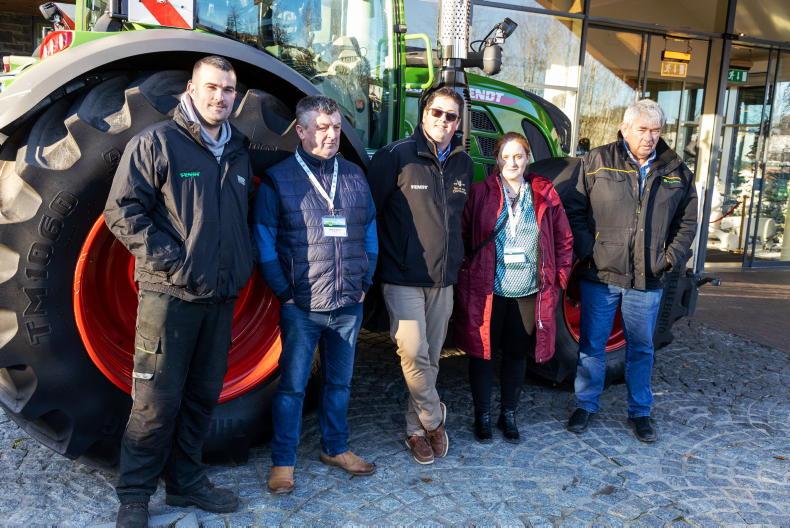
Niall Richardson, Atkins Farm Machinery; Thomas Barron, Kilkenny; Patrick Nolan, Kildare FCI Executive Council; Laura Nolan, Belan Agri Contractors, Moone, Co Kildare and John Bailey, Wexford at the FCI Contractor Conference in The Heritage, Killenard. Picture: Alf Harvey.
In his closing note, Heydon said: “As contractors you step on to hundreds of farms every year to carry out work. I would urge you all where you do spot a potential hazard, or a dangerous practice, and using your trusted relationship with the farmer, to say it to them and urge them to correct it.”
Recognition
FCI chief executive Michael Moroney challenged the minister: “We employ around 20,000 people and contribute €750m turnover, and we get zero support – even the greyhound industry get €18m each year. We want to get recognition; we have failed to find a home for agri-contracting – it gets passed from Finance to Transport to the Department of Agriculture. We have been on the merry-go-round for the past 10 years – the farming sector sings the songs but the contractors provide the lighting and the sound, without us there’s no concert and there’s no farming. When are you going to officially recognise contractors?
In response, the minister said: “First of all, I would like to recognise the professionalism of the FCI and the strategy you’ve taken in recent years in terms of representation and articulating those points, and that’s a conversation we’ve had previously as well. The reason I’m here today is to show that I recognise the sector.
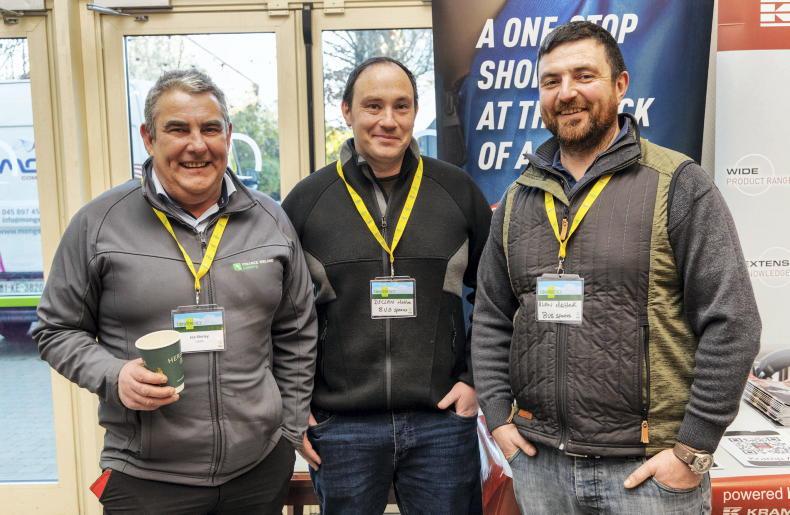
Joe Shirley, Ballacolla, C Laois with Declan and Alan Maher from BUS Spares at the FCI Contractor Conference in The Heritage, Killenard. Picture: Alf Harvey.
“In terms of contractors, we [Department of Agriculture] are the lead department, I accept that. But we will never be able to make decisions on taxation matters. That’s a matter for the Department of Finance.
“In terms of overall recognition, it’s great to see the desire for FCI to create an official register of contractors. That would be important. I look forward to working with you in the new year, providing I’m still in this role, to see how we can best put in place building blocks towards that.”
Open conversation
A panel of expert speakers in areas such as the Nitrates Directive, and the new fertiliser database regulations spoke, outlining that water quality is an issue for all, including contractors, to ensure environmental targets are met.
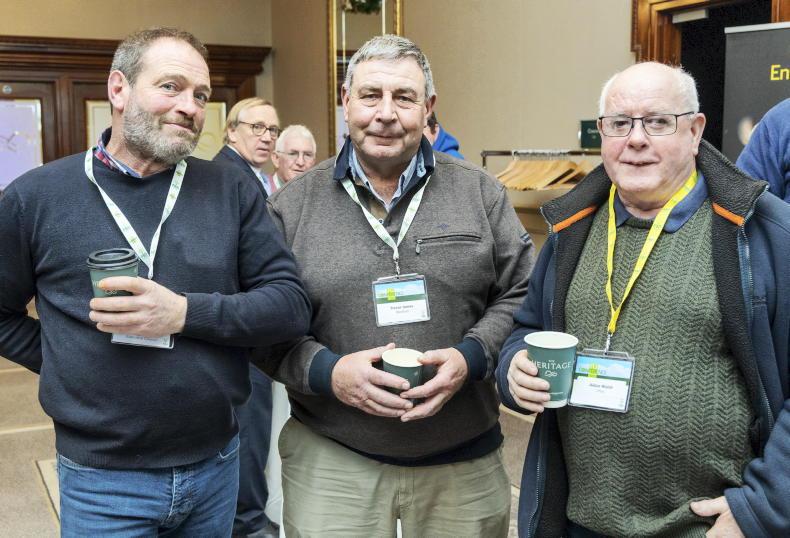
Norman Egar, Kildare FCI Executive Council; Trevor James, Wexford and Aidan Walsh, Offaly.\ Alf Harvey.
Emma Dillon from Teagasc went through National Farm Survey data, outlining that there are 5,215 farms with a small agri-contracting business.
Open conversation was had around topics such as slurry spreading dates, Teagasc advice to farmers around buying low-emission slurry spreading equipment (LESS), rolling fields, buffer zones, the practicality of schemes and the possibility of opening grant aid to contractors in the future. Contractors strongly asked for more grant aid for farmers on concrete for storage – for both slurry and silage, and less for “shiny metal”.
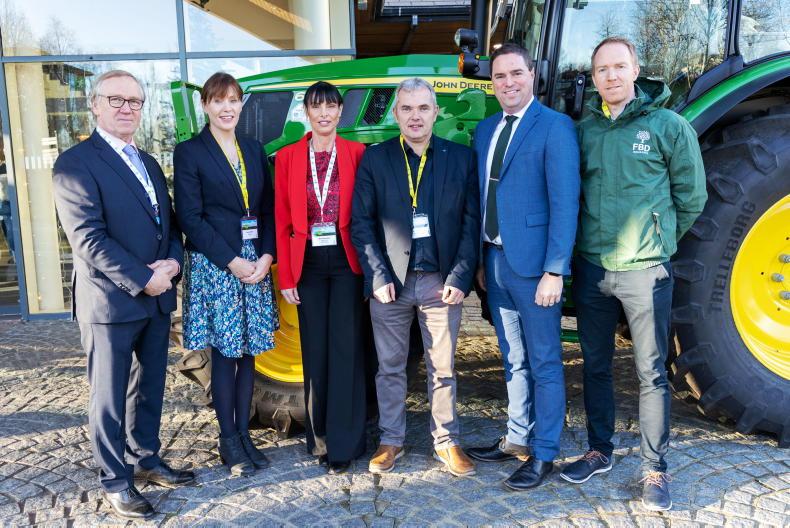
John Hughes, FCI National Chair; Emma Dillon, Teagasc; Ann Hanrahan from Offaly and FCI Vice-Chair; Shay Phelan, Teagasc; Minister Martin Heydon and Patrick Carey, FBD . \ Alf Harvey.
One north Clare contractor, who was soon supported by quite a few more in the room said: “This is something that has been happening for quite a few years in our area. Teagasc have been telling farmers pay your bank, pay your feed stuff, pay this, pay that, but leave the contractor until last. That advice needs to change. Is that something you can pass on? This needs to stop. We’re in business to keep in business. And we need to be paid quickly.”
Dillon, an economist with Teagasc, replied: “Clearly that’s not something that would be acceptable at all, and it shouldn’t be happening, if it is.”
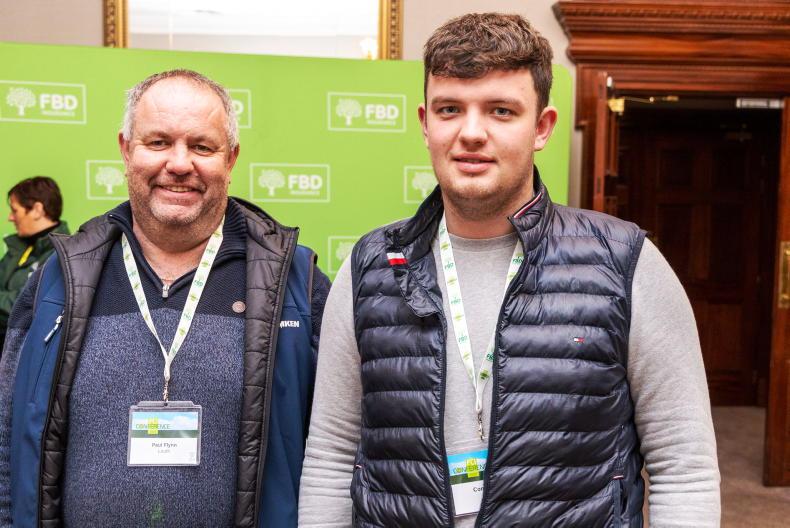
Paul and Conor Flynn from Louth at the FCI Contractor Conference in The Heritage, Killenard. Picture: Alf Harvey.
The moderator and former national chair Richie White, replied: “It has happened, to be fair. We have many reports of this in the last few years. We don’t like this. It impacts us drastically, when we hear that mindset going on, because we are people providing this service to our customers, who are farmers obviously, and it’s really not on”.

Brian Cullen, Wicklow; Patrick Farrelly, Meath; Noel Cooney, Meath and Eamonn Cullen, Wicklow.\ Alf Harvey.
FCI breakeven costing app FCI used the conference to launch its new breakeven costing app.
It says that for many contractors, establishing the breakeven cost for each operation has become difficult. It added that contractors often resort to quoting charges for work based on a combination of what they believe others are charging and under-cutting that rate in a race to achieve more output from their expensive machinery.
Michael Moroney said that 2022 opened people’s eyes and that contractors need to start looking seriously at machinery costs. He noted that travelling between jobs alone, tractors are burning 15 to 20l/hour. At 1.06/l plus VAT for fuel, it’s costing €15.90/hr plus VAT to get from job to job, a 76% increase on 2021.
He said FCI recognised contractors needed a more practical approach to reflect the nature of their business. Outlining that many contractors are not fully aware of their cost base, it was added that each contractor business will have a different cost base due to a combination of operational factors.
New app
FCI has worked with agricultural consultant PJ Phelan to help provide some guidance on how to establish breakeven costs in the farm contracting business, based on fuel usage levels.
The contractor costs fall under 12 headings and are then all directly related to the level of agricultural diesel consumed for each specific operation of the business by means of an index.
This is called the cost per litre of fuel used index, so each cost to the contractor business is linked to a fuel index based on annual fuel consumption levels measured against the specific business cost. For example, if your annual total wage cost is €100,000 and your annual agricultural diesel usage is 100,000 litres, then the index for wages is 1.0.
If your annual fuel bill is €140,000 then the index for fuel is 1.4. Add up all the index figures and you get a total contracting business index figure which you then use to establish breakeven costs for each operation.
It’s designed to allow you to establish your contracting business operation costs based on your fuel usage per enterprise or operation. The FCI says from now on, contractors need to keep an accurate account of fuel used in each job and for each customer.
How does the system work?
Establish your overall costs as outlined in the first table below based on the latest figures from your annual accounts. Ask your accountant for this information or you may already have it.
This system then divides this cost item by your annual or estimated diesel usage to give you a cost/litre of fuel used index in the third column. As your costs change so will the values in the third column index.
To calculate depreciation costs you need to add up the total realistic values of your machines and divide by 10. (€1m worth of machinery has a depreciation cost of about €100,000 each year).
At the base of the table you will see the totals, including the total costs and the total of the fuel cost index for the business.
Each contractor business will have a different fuel cost index figure as they each will have a different cost base.
To calculate your breakeven costs, multiply the fuel cost index figure by the actual fuel used in litres per day for the job in hand and divide this figure by the work output in terms of acres, hours, bales, loads of slurry, etc as outlined in the examples below.
Moroney said the figures (ex VAT) are startling for many contractors, who then need to include a profit margin on top of this breakeven cost. This fuel cost index system provides a more realistic approach to costings for contractors.
FCI are encouraging all contractors to carry out this fuel cost index analysis exercise on their business.
Machinery sharing agreementsShay Phelan of Teagasc spoke about a new machinery sharing agreement that Teagasc has recently launched. According to Teagasc, the average tillage machinery cost is €343/ha (not including labour), with some up to €500/ha, meaning it’s the largest single cost on tillage farms. They said that 14% of farms had higher costs than standard contractor charges, meaning they would have been better off hiring in a contractor. The other point to note here is that farm scale is not necessarily a solution.
This was a significant driver behind this initiative, which attempts to guide or formalise existing and new machine sharing arrangements. He referenced the CUMA system in France and machinery rings in Scotland, both of which enable farmers to come together to help spread the cost of specific items of machinery. He added that this has the potential to decrease the overall cost on each of the sharing farms, while possibly decreasing the unit cost of that machine for an individual grower.
In terms of the role of contractors in this, Phelan said he wanted to offer an open thinking approach, where tillage farmers could potentially partner up with contractors. For example, tillage farmers only need grain trailers for four weeks of the year, so why not partner with a contractor who would use it for silage? In Scotland, he said that the availability of skilled labour in such partnerships to operate technically advanced machinery was the biggest gain for contractors. He noted that tillage farmers are generally competent at operating machinery so why not work together?
Teagasc has developed a template to give guidance on; purchasing details and ownership, finance, depreciation, facilitation, booking procedure, storage, maintenance and repairs and finally, tax and insurance. It can be legally binded and drafted by a solicitor, or can be just a guideline.
The topic interested quite a few, but many felt this type of system wouldn’t be overly successful in Ireland and may work against contractors.
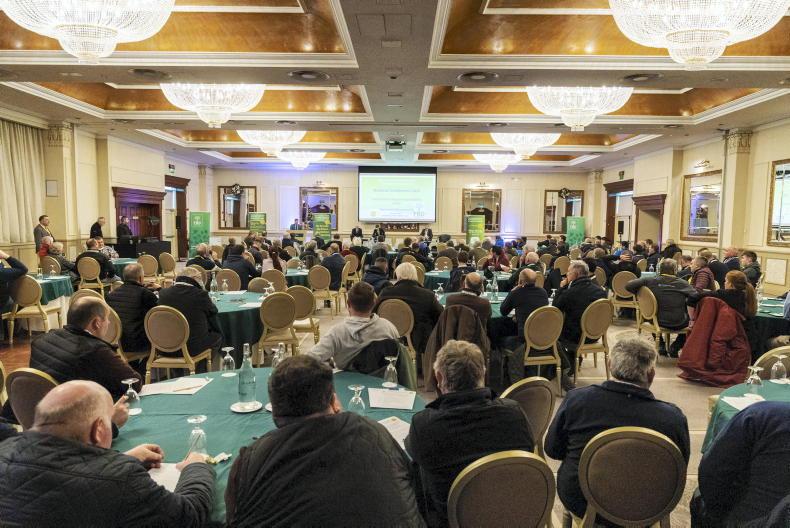
Minister of State at the Department of Agriculture, Food and the Marine, Martin Heydon TD at the FCI conference in The Heritage, Killenard. \ Alf Harvey.

Niall Richardson, Atkins Farm Machinery; Thomas Barron, Kilkenny; Patrick Nolan, Kildare FCI Executive Council; Laura Nolan, Belan Agri Contractors, Moone, Co Kildare and John Bailey, Wexford at the FCI Contractor Conference in The Heritage, Killenard. Picture: Alf Harvey.

Minister of State at the Department of Agriculture, Food and the Marine, Martin Heydon TD at the FCI conference. \ Alf Harvey.

Joe Shirley, Ballacolla, C Laois with Declan and Alan Maher from BUS Spares at the FCI Contractor Conference in The Heritage, Killenard. Picture: Alf Harvey.

Norman Egar, Kildare FCI Executive Council; Trevor James, Wexford and Aidan Walsh, Offaly.\ Alf Harvey.

John Hughes, FCI National Chair; Emma Dillon, Teagasc; Ann Hanrahan from Offaly and FCI Vice-Chair; Shay Phelan, Teagasc; Minister Martin Heydon and Patrick Carey, FBD . \ Alf Harvey.

Paul and Conor Flynn from Louth at the FCI Contractor Conference in The Heritage, Killenard. Picture: Alf Harvey.

Brian Cullen, Wicklow; Patrick Farrelly, Meath; Noel Cooney, Meath and Eamonn Cullen, Wicklow.\ Alf Harvey.
The Association of Farm & Forestry Contractors in Ireland (FCI) staged its 2022 conference on Wednesday 7 December at the Heritage Hotel in Co Laois.
The event had the theme farm contractors in responsibility crisis, and was attended by around 180 contractors from all over the country.
According to FCI, contractors provide machinery services to 137,000 Irish farms in a business that is valued at over €800m annually. From speaking to contractors, the big win they felt they achieved at the event was widespread recognition of the role they play, largely from the Department of Agriculture and Teagasc.
A ‘central role’
Opening the event Minister of State Martin Heydon said: “Contractors play a central role in supporting farmers and by extension the wider agri-food sector. I want to recognise that here today, as well as the economic contribution of contractors themselves to rural communities.
“One area where I believe the role of contractors is growing is working with farmers to deliver on the ambitions around climate, environment and biodiversity.”

Minister of State at the Department of Agriculture, Food and the Marine, Martin Heydon TD at the FCI conference. \ Alf Harvey.
The minister said contractors are “centrally involved” in relation to meeting agriculture’s climate targets, whether it’s correct timing and application (of slurry), investment in newer equipment, spreading lime or carrying out reseeding.
He said one of the seven measures under the eco schemes of the new CAP is the precision spreading of pesticides and fertilisers. “This equipment is not present on many farms and so farmers who choose this option will be relying on their contractor to deliver this service. GPS equipment is central to ensuring we make best use of these expensive inputs.
“I would say in addition to the many and varied services they [contractors] provide to farmers, they are also well placed in a position of trust and respect to advise and assist farmers. It makes contractors an invaluable part of the agri ecosystem as we move through this decade of real evolution in the sector.”

Niall Richardson, Atkins Farm Machinery; Thomas Barron, Kilkenny; Patrick Nolan, Kildare FCI Executive Council; Laura Nolan, Belan Agri Contractors, Moone, Co Kildare and John Bailey, Wexford at the FCI Contractor Conference in The Heritage, Killenard. Picture: Alf Harvey.
In his closing note, Heydon said: “As contractors you step on to hundreds of farms every year to carry out work. I would urge you all where you do spot a potential hazard, or a dangerous practice, and using your trusted relationship with the farmer, to say it to them and urge them to correct it.”
Recognition
FCI chief executive Michael Moroney challenged the minister: “We employ around 20,000 people and contribute €750m turnover, and we get zero support – even the greyhound industry get €18m each year. We want to get recognition; we have failed to find a home for agri-contracting – it gets passed from Finance to Transport to the Department of Agriculture. We have been on the merry-go-round for the past 10 years – the farming sector sings the songs but the contractors provide the lighting and the sound, without us there’s no concert and there’s no farming. When are you going to officially recognise contractors?
In response, the minister said: “First of all, I would like to recognise the professionalism of the FCI and the strategy you’ve taken in recent years in terms of representation and articulating those points, and that’s a conversation we’ve had previously as well. The reason I’m here today is to show that I recognise the sector.

Joe Shirley, Ballacolla, C Laois with Declan and Alan Maher from BUS Spares at the FCI Contractor Conference in The Heritage, Killenard. Picture: Alf Harvey.
“In terms of contractors, we [Department of Agriculture] are the lead department, I accept that. But we will never be able to make decisions on taxation matters. That’s a matter for the Department of Finance.
“In terms of overall recognition, it’s great to see the desire for FCI to create an official register of contractors. That would be important. I look forward to working with you in the new year, providing I’m still in this role, to see how we can best put in place building blocks towards that.”
Open conversation
A panel of expert speakers in areas such as the Nitrates Directive, and the new fertiliser database regulations spoke, outlining that water quality is an issue for all, including contractors, to ensure environmental targets are met.

Norman Egar, Kildare FCI Executive Council; Trevor James, Wexford and Aidan Walsh, Offaly.\ Alf Harvey.
Emma Dillon from Teagasc went through National Farm Survey data, outlining that there are 5,215 farms with a small agri-contracting business.
Open conversation was had around topics such as slurry spreading dates, Teagasc advice to farmers around buying low-emission slurry spreading equipment (LESS), rolling fields, buffer zones, the practicality of schemes and the possibility of opening grant aid to contractors in the future. Contractors strongly asked for more grant aid for farmers on concrete for storage – for both slurry and silage, and less for “shiny metal”.

John Hughes, FCI National Chair; Emma Dillon, Teagasc; Ann Hanrahan from Offaly and FCI Vice-Chair; Shay Phelan, Teagasc; Minister Martin Heydon and Patrick Carey, FBD . \ Alf Harvey.
One north Clare contractor, who was soon supported by quite a few more in the room said: “This is something that has been happening for quite a few years in our area. Teagasc have been telling farmers pay your bank, pay your feed stuff, pay this, pay that, but leave the contractor until last. That advice needs to change. Is that something you can pass on? This needs to stop. We’re in business to keep in business. And we need to be paid quickly.”
Dillon, an economist with Teagasc, replied: “Clearly that’s not something that would be acceptable at all, and it shouldn’t be happening, if it is.”

Paul and Conor Flynn from Louth at the FCI Contractor Conference in The Heritage, Killenard. Picture: Alf Harvey.
The moderator and former national chair Richie White, replied: “It has happened, to be fair. We have many reports of this in the last few years. We don’t like this. It impacts us drastically, when we hear that mindset going on, because we are people providing this service to our customers, who are farmers obviously, and it’s really not on”.

Brian Cullen, Wicklow; Patrick Farrelly, Meath; Noel Cooney, Meath and Eamonn Cullen, Wicklow.\ Alf Harvey.
FCI breakeven costing app FCI used the conference to launch its new breakeven costing app.
It says that for many contractors, establishing the breakeven cost for each operation has become difficult. It added that contractors often resort to quoting charges for work based on a combination of what they believe others are charging and under-cutting that rate in a race to achieve more output from their expensive machinery.
Michael Moroney said that 2022 opened people’s eyes and that contractors need to start looking seriously at machinery costs. He noted that travelling between jobs alone, tractors are burning 15 to 20l/hour. At 1.06/l plus VAT for fuel, it’s costing €15.90/hr plus VAT to get from job to job, a 76% increase on 2021.
He said FCI recognised contractors needed a more practical approach to reflect the nature of their business. Outlining that many contractors are not fully aware of their cost base, it was added that each contractor business will have a different cost base due to a combination of operational factors.
New app
FCI has worked with agricultural consultant PJ Phelan to help provide some guidance on how to establish breakeven costs in the farm contracting business, based on fuel usage levels.
The contractor costs fall under 12 headings and are then all directly related to the level of agricultural diesel consumed for each specific operation of the business by means of an index.
This is called the cost per litre of fuel used index, so each cost to the contractor business is linked to a fuel index based on annual fuel consumption levels measured against the specific business cost. For example, if your annual total wage cost is €100,000 and your annual agricultural diesel usage is 100,000 litres, then the index for wages is 1.0.
If your annual fuel bill is €140,000 then the index for fuel is 1.4. Add up all the index figures and you get a total contracting business index figure which you then use to establish breakeven costs for each operation.
It’s designed to allow you to establish your contracting business operation costs based on your fuel usage per enterprise or operation. The FCI says from now on, contractors need to keep an accurate account of fuel used in each job and for each customer.
How does the system work?
Establish your overall costs as outlined in the first table below based on the latest figures from your annual accounts. Ask your accountant for this information or you may already have it.
This system then divides this cost item by your annual or estimated diesel usage to give you a cost/litre of fuel used index in the third column. As your costs change so will the values in the third column index.
To calculate depreciation costs you need to add up the total realistic values of your machines and divide by 10. (€1m worth of machinery has a depreciation cost of about €100,000 each year).
At the base of the table you will see the totals, including the total costs and the total of the fuel cost index for the business.
Each contractor business will have a different fuel cost index figure as they each will have a different cost base.
To calculate your breakeven costs, multiply the fuel cost index figure by the actual fuel used in litres per day for the job in hand and divide this figure by the work output in terms of acres, hours, bales, loads of slurry, etc as outlined in the examples below.
Moroney said the figures (ex VAT) are startling for many contractors, who then need to include a profit margin on top of this breakeven cost. This fuel cost index system provides a more realistic approach to costings for contractors.
FCI are encouraging all contractors to carry out this fuel cost index analysis exercise on their business.
Machinery sharing agreementsShay Phelan of Teagasc spoke about a new machinery sharing agreement that Teagasc has recently launched. According to Teagasc, the average tillage machinery cost is €343/ha (not including labour), with some up to €500/ha, meaning it’s the largest single cost on tillage farms. They said that 14% of farms had higher costs than standard contractor charges, meaning they would have been better off hiring in a contractor. The other point to note here is that farm scale is not necessarily a solution.
This was a significant driver behind this initiative, which attempts to guide or formalise existing and new machine sharing arrangements. He referenced the CUMA system in France and machinery rings in Scotland, both of which enable farmers to come together to help spread the cost of specific items of machinery. He added that this has the potential to decrease the overall cost on each of the sharing farms, while possibly decreasing the unit cost of that machine for an individual grower.
In terms of the role of contractors in this, Phelan said he wanted to offer an open thinking approach, where tillage farmers could potentially partner up with contractors. For example, tillage farmers only need grain trailers for four weeks of the year, so why not partner with a contractor who would use it for silage? In Scotland, he said that the availability of skilled labour in such partnerships to operate technically advanced machinery was the biggest gain for contractors. He noted that tillage farmers are generally competent at operating machinery so why not work together?
Teagasc has developed a template to give guidance on; purchasing details and ownership, finance, depreciation, facilitation, booking procedure, storage, maintenance and repairs and finally, tax and insurance. It can be legally binded and drafted by a solicitor, or can be just a guideline.
The topic interested quite a few, but many felt this type of system wouldn’t be overly successful in Ireland and may work against contractors.

Minister of State at the Department of Agriculture, Food and the Marine, Martin Heydon TD at the FCI conference in The Heritage, Killenard. \ Alf Harvey.

Niall Richardson, Atkins Farm Machinery; Thomas Barron, Kilkenny; Patrick Nolan, Kildare FCI Executive Council; Laura Nolan, Belan Agri Contractors, Moone, Co Kildare and John Bailey, Wexford at the FCI Contractor Conference in The Heritage, Killenard. Picture: Alf Harvey.

Minister of State at the Department of Agriculture, Food and the Marine, Martin Heydon TD at the FCI conference. \ Alf Harvey.

Joe Shirley, Ballacolla, C Laois with Declan and Alan Maher from BUS Spares at the FCI Contractor Conference in The Heritage, Killenard. Picture: Alf Harvey.

Norman Egar, Kildare FCI Executive Council; Trevor James, Wexford and Aidan Walsh, Offaly.\ Alf Harvey.

John Hughes, FCI National Chair; Emma Dillon, Teagasc; Ann Hanrahan from Offaly and FCI Vice-Chair; Shay Phelan, Teagasc; Minister Martin Heydon and Patrick Carey, FBD . \ Alf Harvey.

Paul and Conor Flynn from Louth at the FCI Contractor Conference in The Heritage, Killenard. Picture: Alf Harvey.

Brian Cullen, Wicklow; Patrick Farrelly, Meath; Noel Cooney, Meath and Eamonn Cullen, Wicklow.\ Alf Harvey.






















 This is a subscriber-only article
This is a subscriber-only article










SHARING OPTIONS: